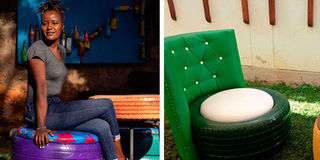Behold, masterpieces from discarded tyres and bottles

Lydiah Kabiru transforms old tyres and bottles into beautiful furniture.
What you need to know:
- When Lydiah Kabiru’s side hustle overtook her main one, she said goodbye and focused on her handiwork. It’s the best decision she ever made.
- She couldn’t afford to furnish her home, therefore she decided to make her own. Impressed friends begun to make orders, and, as they say, the rest is history.
It is a small recycling factory during the day, at night, it is Lydiah Kabiru's home.
Miss Kabiru, who is based in Roysambu, Nairobi, transforms discarded tyres and bottles into treasure. On the day we visit, we find her busy making final touches on customised lounge tables. As she skilfully works on her new order, she tells us that desperation led her to her business.
"The year was 2013, I was a young mother without a job, and didn't have stuff in my house, it was an empty room, and since I couldn’t afford to buy what I needed, I decided to make it myself,” she recounts.
She was therefore pleasantly surprised when friends visited, fell in love with her furniture and ordered some pieces for themselves, either similar to what she had, or customised. This is how she kick-started her entrepreneurship journey, recycling worn out tyres and discarded bottles into decorative pieces for the home.
Even then, however, she did not quite believe in her skill as she often wondered whether her friends actually liked her work or were just being sympathetic to her situation, but she kept creating. For the better part of 2014 and 2015, this was just a side hustle to supplement her vegetable business. With time however, more orders started streaming in and outshone her main hustle.
"My tyre tables were especially in demand, and within a short time, the business was doing much better than my main business, selling vegetables," she says.
First major deal
In 2017, her fortunes turned for the better when she stumbled upon her first major project, since then, her life has never been the same again.
"I got my first breakthrough, a big project for a hotel, through the connection of a stranger who bought into my idea despite the fact that I did not even have a sample at the time," Lydiah says.
The project involved making chandeliers, and though it was all new to her, by the time she completed it, she had gained confidence in herself as an artist.
Lydiah, who studied Community Development and Social Work, is especially known for her colourful tables, bedside lampshades and chandeliers, which she makes according to an individual client’s specification.
There are some items whose design she does not repeat since they are custom made, an example is the chandeliers that she created for her first major project. She mostly sources her raw materials from garages and hardwares, using yarns, fabric and paint, she then transforms them into decorative items.
"People who have seen my work often call me to pick material that they don’t need, and when I have a huge project, I buy from a garage at a very affordable price. The costly materials are the yarn, glue, glass, and the table legs ,” she explains.
In pricing her products, she takes into consideration a number of factors, including materials used, size of the item and time it takes her to complete the project. Her customised tables range between Sh10,000 and Sh50,000, while the lampshades cost from Sh2,500. Homes, hotels, offices and people who appreciate art are her target market.
She has also graduated to offering Do It Yourself tutorials which she charges based on the number of students, distance from her place of work and the package chosen. Lydiah did not receive any training for what she does, but, she explains, she has always been creative from childhood. On how she has kept her business firmly on the ground, she explains that she charges her clients upfront.
"I ask my clients to pay half of the cost we agree on in advance to help me meet the production costs. Since I don't have a car, I also ask them to pick their stuff themselves or pay extra for delivery ,” she says.
The business has not been without challenges, for instance, some clients are unable to fully pay up, which leads to products piling up at her workshop. Others take longer than the agreed period to settle their bill after picking the products they ordered.
For marketing, which is crucial to the success of a business, Lydiah uses word of mouth, social media and SMS, which she uses to inform her contacts about new designs. She plans to open an outlet to display her variety of crafts, start an art school and also become a vocal voice in environmental conservation.





